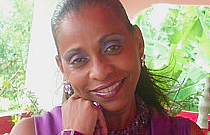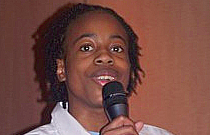Sickle Cell Disease: “a family affair”
 When Jenny’s son, Taylor, was born he was tested for drepanocytosis, sickle cell disease, as both Jenny and her husband are carriers of sickle cell trait. They were told that he was a healthy carrier. However, at five months old Taylor couldn’t stop crying and Jenny’s mother noticed his hands were swollen. After numerous tests, Jenny received a phone call that changed her life.
When Jenny’s son, Taylor, was born he was tested for drepanocytosis, sickle cell disease, as both Jenny and her husband are carriers of sickle cell trait. They were told that he was a healthy carrier. However, at five months old Taylor couldn’t stop crying and Jenny’s mother noticed his hands were swollen. After numerous tests, Jenny received a phone call that changed her life.
“A Friday morning at 11 o’clock. I’ll never forget! A voice said ‘I’m sorry your son is suffering from the most severe form of sickle cell disease, homozygous SS. You should take him immediately to hospital,” explains Jenny. Taylor was nine months old.
Jenny couldn’t imagine a worse diagnosis or a worse way to receive it. “It was said these children did not reach the age of five, so I thought I might as well end it there and then,” she says. The family lived on the sixth floor and Jenny thought the only one thing to do was to take her son in her arms and jump. But when she saw him smiling at her from his cot she decided she was going to fight for him instead.
“Sickle cell disease in our house has become a family affair: not only my husband and our other children, but my brothers, sisters, my mother, my mother-in-law, everyone is fighting with us,” says Jenny.
Taylor is now almost twenty.
 In order to better understand the disease Jenny travelled to places where sickle cell strikes hardest. She made contact with the association APIPD and soon became their spokeswoman, and has been president of the group since 1999. Her priority, not surprisingly, is to make life better for people living with sickle cell. She says, “I would like government to take more account of sickle cell disease. This disease affects everybody and we should stop seeing it as a black person’s disease, even if this segment of the population is more affected than others.”
In order to better understand the disease Jenny travelled to places where sickle cell strikes hardest. She made contact with the association APIPD and soon became their spokeswoman, and has been president of the group since 1999. Her priority, not surprisingly, is to make life better for people living with sickle cell. She says, “I would like government to take more account of sickle cell disease. This disease affects everybody and we should stop seeing it as a black person’s disease, even if this segment of the population is more affected than others.”
Despite the association’s achievements to date – they have participated in four Telethons and held three ‘Drepaction’ in collaboration with the group ‘People against Sickle Cell Disease’ – Jenny is constantly driving herself and her team of volunteers to do more, do better. Her son, Taylor, often works with her, despite his condition and the problems attendant on that condition. He has spent eighteen months in a wheelchair, suffered cardiac arrest and been repeatedly hospitalised. They have both written books about the experience of living with the disease and are working toward creating a foundation in Martinique.
Taylor is as determined as his mother and believes “anything is possible regardless of disability.” Despite a lack of support at school, he now runs his own business, plans to create his own computer company, and is training for his private pilot’s licence.
Jenny was named a Remarkable Woman 2010 by “Femme Actuelle” a proud achievement; but her greatest pride is in her son, her family, the volunteers who give their support and, of course, all those living with sickle cell disease and who, like Taylor, are determined to live life to the full.
This article was first published in the March 2012 issue of the EURORDIS newsletter
Author: Irene Palko
Photo credits: © Jenny Hippocrate
